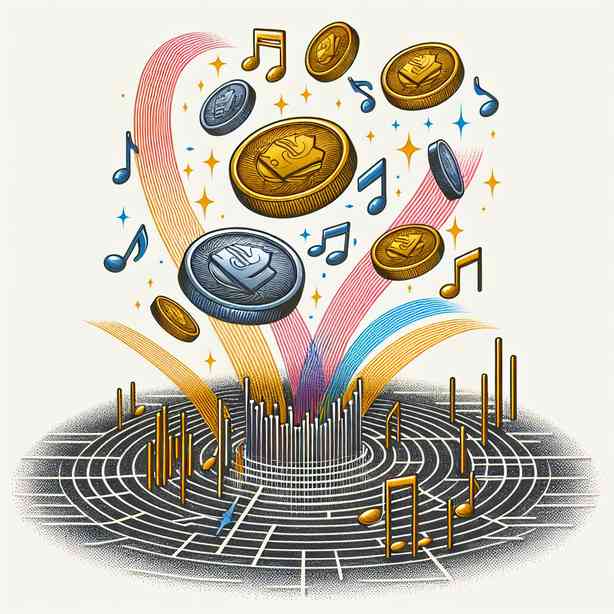
Coin drops, though simple occurrences, can evoke a profound symphony of experiences and emotions. Imagine a moment when a coin, seemingly insignificant, clinks to the ground, stirring not just the air around it but also the thoughts, memories, and stories locked within each observer. The sound of that coin striking the surface is more than just a noise; it’s a small but impactful event that can resonate with individuals in various ways.
To begin, let us explore the concept of a coin drop within the broader context of everyday life. In a bustling street, amidst conversations, laughter, and the sounds of traffic, the sudden noise of a coin falling can cut through the cacophony, grabbing attention. This sharp contrast highlights how mundane actions can momentarily distract us from our routines, offering a chance for reflection. The simplicity of a coin drop serves as a metaphor for life’s gentle reminders to pause and savor the present moment.
As the coin falls and lands, consider the attention it draws. Not only do we hear the sound, but we may also notice the reactions of those around us. A child’s delighted giggle at the shiny object, an adult’s hurried search for their lost change, or even the philosophical musings of a passerby contemplating luck and chance—each reaction manifests a unique narrative. This rich tapestry of responses demonstrates that even a simple event like a coin drop can evoke various thoughts and feelings, akin to the notes of a symphony playing together, each contributing to a greater harmony.
Delving deeper, we can explore the psychological implications of the coin drop. For instance, many people associate coins with various symbolic meanings. The act of dropping a coin could represent loss or an opportunity, depending on one’s perspective. Those who see the coin as a lost form of currency might feel an unexpected sorrow, while others may experience a surge of excitement at the prospect of finding it—a tiny treasure amidst the ordinary. This duality reflects how our personal experiences shape our perceptions. Life’s events, both grand and small, are often colored by our emotions and histories.
Moreover, considering the cultural significance of coins adds another layer to this discussion. In many cultures, coins are symbols of prosperity, luck, and fortune. The proverbial tossing of a coin into a fountain or wishing well is well-known as a ritual filled with hope and desire. By incorporating this cultural lens, the coin drop transforms into an emblem of wishes and dreams waiting to be fulfilled, echoing the melodies of hope within the symphony of life.
As we navigate through these ideas, it becomes clear that a simple coin drop does not merely exist in isolation. It connects us to others, fostering a communal experience. Perhaps someone overhears the drop and pauses, engaging in a spontaneous conversation about childhood memories associated with coins, imparting wisdom to a younger generation about the significance of small things in life. In this way, the coin becomes a bridge linking past and present, uniting people with shared experiences.
For those who enjoy storytelling, the coin serves as an inspiration for creating narratives rich in imagination. One could envision a tale where a child finds a coin that changes their life, leading them on delightful adventures, teaching them valuable lessons along the way. Such stories reflect our innate desire to find meaning in the mundane, reminding us that every little incident has the potential for greater significance—a theme that resonates deeply within human experience.
In educational contexts, utilizing the concept of a coin drop in lessons can enhance engagement. Teachers might use the moment as a teaching opportunity about money, economics, or even probability, helping students develop practical life skills while fostering a sense of curiosity. The drop of a coin can spark discussions about responsibility, saving, or even sharing—important values that shape character and community. Such interactions weave together various threads of knowledge, demonstrating the multifaceted nature of even the simplest events.
From a broader perspective, one can tie the idea of a coin drop to themes of chance and fate. The randomness of a coin landing heads or tails parallels life’s unpredictable nature. Just as we never know where the coin will land, we also cannot foresee the outcomes of our decisions. This uncertainty can be daunting yet exhilarating, embodying the essence of human existence—an endless dance between choice and consequence. It serves as a reminder that every drop, every decision, carries potential for new beginnings, much like the notes of a symphony building towards an exhilarating crescendo.
As we reflect on the various facets of a coin drop, it becomes evident that these occurrences are more than mere sounds; they symbolize the interconnectedness of our lives. Individuals may come together in moments of joy, surprise, contemplation, or even nostalgia, united by the shared experience of something seemingly simple. This underscores the human condition, where our lives are filled with moments that, when combined, create a complex and beautiful symphony of experiences.
In conclusion, the seemingly trivial act of a coin drop is anything but ordinary. It reverberates through the lives of those who witness it, evoking emotions, sparking conversations, and encouraging reflection. As we embrace these moments, let us remember the importance of the small things that contribute to the larger symphony of life. Each drop, each sound, adds its unique note, harmonizing with our experiences and creating a narrative that is both personal and shared. Thus, every coin drop becomes an opportunity to connect, reflect, and appreciate the intricate melodies that weave through our everyday lives.


